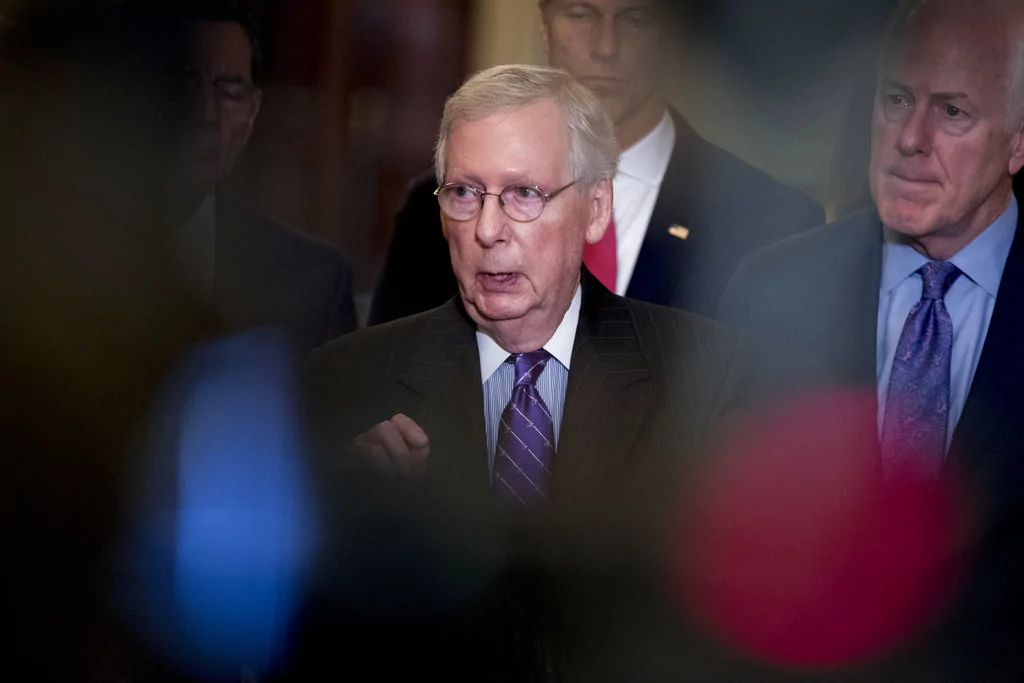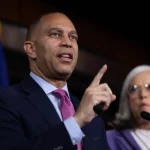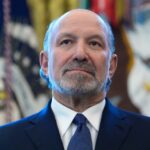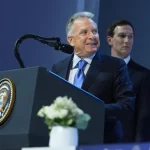
Republican senators emerged Tuesday night from a candidate forum largely tight-lipped on which of their colleagues they would support to replace Senate GOP Leader Mitch McConnell (R-KY) on the eve of a secret ballot vote and President-elect Donald Trump’s visit to Washington.
Two hours of huddling behind closed doors with the trio of contenders fielding questions offered few clues to senators over who will prevail Wednesday in what will amount to the GOP’s biggest Senate leadership shakeup since McConnell first took the reins nearly two decades ago.
Those candidates are Whip John Thune (R-SD), former Whip John Cornyn (R-TX), and Sen. Rick Scott (R-FL).
“It’s going to be close, but it looks like it’s going to be Caitlin Clark,” quipped Sen. John Kennedy (R-LA), referencing the basketball star, as he declined to say who he’d back.
Scott, an anti-establishment underdog, picked up two public — but perhaps unsurprising — endorsements from conservatives Sen. Marsha Blackburn (R-TN) and Sen. Mike Lee (R-UT). Lee hosted the meeting, acting as an informal debate moderator.
“We need aggressive reform and an aggressive return to the rules that made this entity something worthy of the title of the ‘world’s greatest deliberative body,’” Lee said. “And the most aggressive call for reform came from Rick Scott.”
Still, most senators chose to keep quiet on the contested leadership battle that could otherwise strain future working relationships. Trump, who’s not weighed in on the race but has been courted by Scott and his MAGA-world base of supporters, was set to arrive at lawmakers’ doorstep Wednesday for meetings with House Republicans and then a sit-down with President Joe Biden at the White House. Senators were unsure whether Trump would also make an appearance on their side of the Capitol.
Additional behind-the-scenes contention centered on how Trump’s political comeback should be factored into the leader race and the soon-to-be Republican Senate majority. His controversial push for the Senate to set aside its “advice and consent” role of confirming presidential nominees by allowing Trump to install recess appointments without congressional approval remained the extent to which he appeared willing to enter the fray.
Thune, Cornyn, and Scott are supportive of offering Trump such deference, but Thune and Cornyn have notably expressed a desire to remain in session to first exhaust other avenues. All three reaffirmed commitments to Trump’s agenda, according to senators.
“The president’s entitled to get his team in a timely basis. Any obstruction will be met with massive overwhelming force,” Cornyn told reporters. “Democrats are going to probably drag their feet. We’ll stay in session until they relent.”
Other topics raised, according to senators in the room, included reining in federal spending, the debt ceiling, reconciliation, a tax package, and changes to the chamber’s amendment process.
There were also some tensions over a last-minute delay to the elections to allow senators more deliberation after returning to the Senate for the first time in nearly two months. Those talks were led by Sen. Ron Johnson (R-WI), who backs Scott.
“McConnell had this stuff just all cooked, where you have the election, you come back in here, and you vote right away. And again, that’s what he did this time, which I laid that out,” Johnson said. “I’m offended by that. This is grotesque, the way we’re rushing to this. But at least we had this forum.”

Most senators indicated a lack of appetite to postpone, a motion for which would need to be proposed and passed by a majority of Republicans when they convene Wednesday morning for their elections.
“I stood up to that,” Sen. Kevin Cramer (R-ND), told the Washington Examiner on opposing senators who wanted more time.
Cramer, who backs Thune, noted the leadership election has long been planned.
“This did not sneak up on anybody, and if it did, that’s their fault, not anybody else,” he added.
Some Republicans expressed a broader willingness to consider what was described by several senators as a “pause” before a potential second ballot, which would occur with the top two performing candidates if none receives a majority vote on the first round.
Speculation swirled around what it could mean for Thune and Cornyn if they’re forced to compete in a second round for Scott’s supporters. Cramer cautioned assumptions that those who vote for Scott on round one would be more inclined to support Cornyn than Thune in round two.
“I think that the Scott supporters, unless they make a pledge to all vote the same — it’s sort of like expecting Hispanics to all vote for Kamala,” Cramer said. “Oops. Bad assumption.”
WHO WILL SERVE IN PRESIDENT-ELECT DONALD TRUMP’S CABINET? WHAT WE KNOW
Senators-elect will also get a say in the leadership elections, but senators retiring will not. Bernie Mereno of Ohio, Dave McCormick of Pennsylvania, and Rep. John Curtis (R-UT) declined to reveal their candidate of choice.
“I think for me, it’s the person who can best unite the conference,” Curtis said. “I’ve seen in the House what happens when you have a conference that’s not united.”







